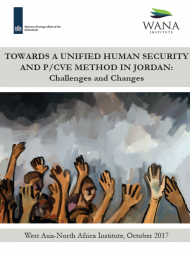-
Towards a Unified Human Security and P/CVE Method in ...
Towards a Unified Human Security and P/CVE Method in Jordan: Challenges and Changes
The threat of violent extremism facing the West Asia-North Africa (WANA) region and beyond has signalled the need for broader and more holistic conceptualisations of the key notions underpinning the phenomenon. To date, governments, donors and practitioners have approached Preventing and Countering Violent Extremism (P/CVE) as an isolated exercise, largely removed from longer-term human security and development interventions. As the scholarship has evolved, however, it is increasingly clear that P/CVE must be understood through the lens, and as a pillar, of human security.
To address this deficit, this research investigates the relationship between human security programming in Jordan and P/CVE efforts, and the extent to which this relationship is reinforcing and symbiotic, or disobliging and encumbering. We focus on the four pillars of human security deemed more relevant to P/CVE efforts: economic security, political security, personal security and communal security. The role, relevance and engagement of youth in each of these pillars, features in a cross-cutting manner.
From this analysis, a Theory of Change (ToC) is presented. This ToC bridges current programming challenges and mid-term goals, in a way that may facilitate a better integration of P/CVE efforts into human security programming. We identify three thematic and four actor-based challenges to achieving this integrated approach. First, donor attention towards Syrian refugees has fuelled a perception of relative deprivation, which has eroded social cohesion. Second, the short-term and selective nature of donor-funded programming renders youth as an increasingly vulnerable demographic. Third, sluggish progress in women’s empowerment has restricted their ability to counter radicalisation and extremism within their communities. Actor-based challenges include: beneficiaries’ increasing reluctance to participate in programming without financial remuneration, de-contextualised programme design, and the inherent weakness of the civil society sector vis-à-vis the bureaucratic requirements imposed upon them.
This publication is generously supported with funds on behalf of the Ministry of Foreign Affairs of the Netherlands.

